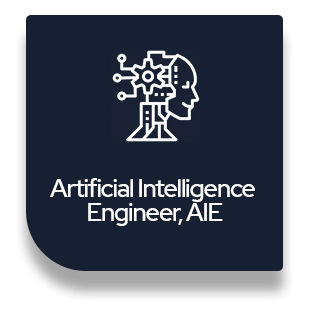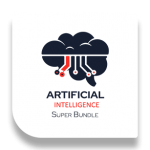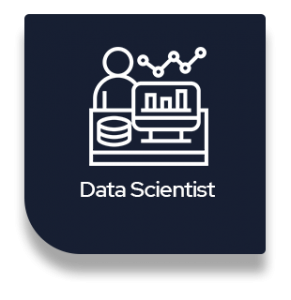Artificial Intelligence (AI), a computer science study for developing software or machines that display human intelligence and is growing at a swift pace. Whether it’s choosing your news feed, Google search results, or Facebook algorithms, AI is doing its job with perfection. In a nutshell, AI development is the science of machines that can solve crises as a human would. From search engines to self-driving cars, AI has been at the center of some of the most incredible projects. According to studies, artificial intelligence will seep into your daily lives by 2025. As a result, artificial Intelligence jobs would be among the fastest-growing jobs in the technological sector, creating additional career prospects for those with the right AI skills. Moreover, AI Engineers’ salaries careers are among the best in the world. So, the question is, how to become an AI engineer?
Who is an Artificial Intelligence Engineer?
Artificial Intelligence Engineers, AIE are people involved in problem-solving or Artificial Intelligence technology. They create, test, and implement AI models, along with the handling of the AI infrastructure. In addition, they cruise through traditional software models and Machine Learning models. With the development of Artificial Intelligence and Machine Learning in different areas of the IT industry, the demand for these IT professionals is high.
How To Become An AI Engineer?
To succeed in Artificial Intelligence jobs, you need to have an analytical thought process and solve problems with cost-effective, efficient solutions. In addition, AI engineers also need to have insight into technological innovations that translate to state-of-the-art programs. The following topics provide an insight into the prerequisites that you must acquire to get the AI job of your dreams.
Earn Educational Qualifications or, better yet, get an AI Certification
Let’s start with the basics. You go with the bachelor’s degree route first. You can earn a degree in either of the following subjects to be an AI engineer: Computer Science, Mathematics, Information Technology, Statistics, Finance, and Economics. An AI certification path could do very much the same cheaper and in less time.
Technical Skills
If you are researching how to become an AI engineer, you need to up your software development techniques and practices and your programming skills. Make sure that you are theoretically and practically well-informed in the following topics:
- Programming languages
- Statistical knowledge
- Applied Maths and Algorithms
- Natural Language Processing
- Deep Learning & neural networks
Programming Languages
It would be best if you had an excellent grasp of programming languages, such as Python, R, Java, C++, etc. It’s critical to have a robust understanding of classes and data structures. At times, just the knowledge of these technologies may not suffice. You might come across projects where you need to leverage hardware knowledge for enhancements. You must be familiar with basic algorithms, classes, memory management, and linking.
- Python
- Java
- C++
- Lisp
- R
- Prolog, etc.
Statistical Knowledge and Applied Math and Algorithms in Machine Learning
You will need to be intimately familiar with matrices, vectors, and matrix multiplication in statistical knowledge. If you have an understanding of derivatives and integrals, you should be clear. Statistics are going to come up a lot. At least make sure you are familiar with Gaussian distributions, means, and standard deviations. Areas, where you will frequently be using your algorithms and applied mathematics knowledge are:
- Quadratic programming
- Partial differential equations
- Gradient descent
- Lagrange
- Convex Optimization, etc.
To be a successful AI engineer, you must have in-depth knowledge of algorithm theory and how algorithms work. All this math might seem intimidating at first if you’ve been away from it for a while. So be prepared; Machine Learning and Artificial Intelligence are much more math-intensive than something like front-end development.
Natural Language Processing
Natural Language Processing combines two of the major areas of Machine Learning and Artificial Intelligence: Linguistics and Computer Science. The possibility of you working with either text or audio, or video is very high. Therefore, as an AI Engineer, you have to work extensively on NLP, which involves language, audio, and video processing by leveraging various NLP libraries and tools, including:
- NTLK
- Sentiment Analytics
- Gensim
- TextBlob
- CoreNLP
- PyNLPI, etc.
Deep Learning & Neural Networks
At times, we might need Machine Learning for too complex tasks for humans to code directly. This is where neural networks come in. Neural networks are modeled after the human brain, which can recognize numerical patterns based on sensory data.
The Artificial Intelligence world has naturally progressed from single-layer neural networks to Deep Learning neural networks, in which data is passed through multiple layers for more complex pattern recognition. Deep neural networks have been the most accurate way of approaching complex problems, like Translation, Speech Recognition, and Image Classification, which play a vital role in AI.
Necessary Business Skills
To secure an artificial intelligence job, you need to possess certain business skills along with your technical skills. The following are some of the business skills required to be a successful AI engineer:
- Creative thinking
- Effective communication
- Analytic problem-solving skills
- Industry knowledge
Certification Courses
You can accomplish all the above-mentioned skills through practice or by choosing a certification course. Completing a certification course in Data Science, Machine Learning, or Artificial Intelligence is highly recommended to be an AI engineer. These certifications will add value to your resume and help you acquire in-depth knowledge of AI topics, along with hiking up your pay to match an AI Engineer’s salary.
As the domain of AI is new, there are still many sectors that have not yet used AI. So, before the ‘how’ part, let us briefly squint to the ‘why’ part. First, let us see the trends that Gartner predicts about Artificial Intelligence:
AI will create a business value worth US$3.9 trillion by 2022.
Artificial Intelligence is expected to be the most disruptive technology category in the next decade due to the advances in computing power, capacity, speed, and data diversity, and progresses in deep neural networks (DNN)
Decision automation systems (systems that leverage AI to automate business processes or tasks such as translating voice, classify data that conventional systems, etc., cannot easily classify) will grow to 16 percent by the next 4–5 years—a staggering jump; of 14 percent!
Get a jump on the future and get AIE certified with our Skilldacity AI Training bundle.




